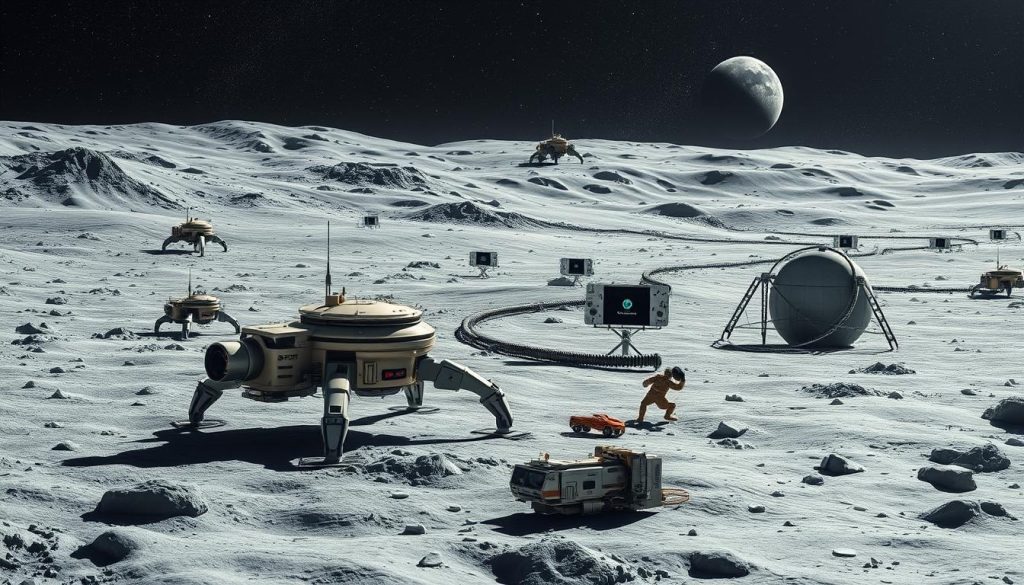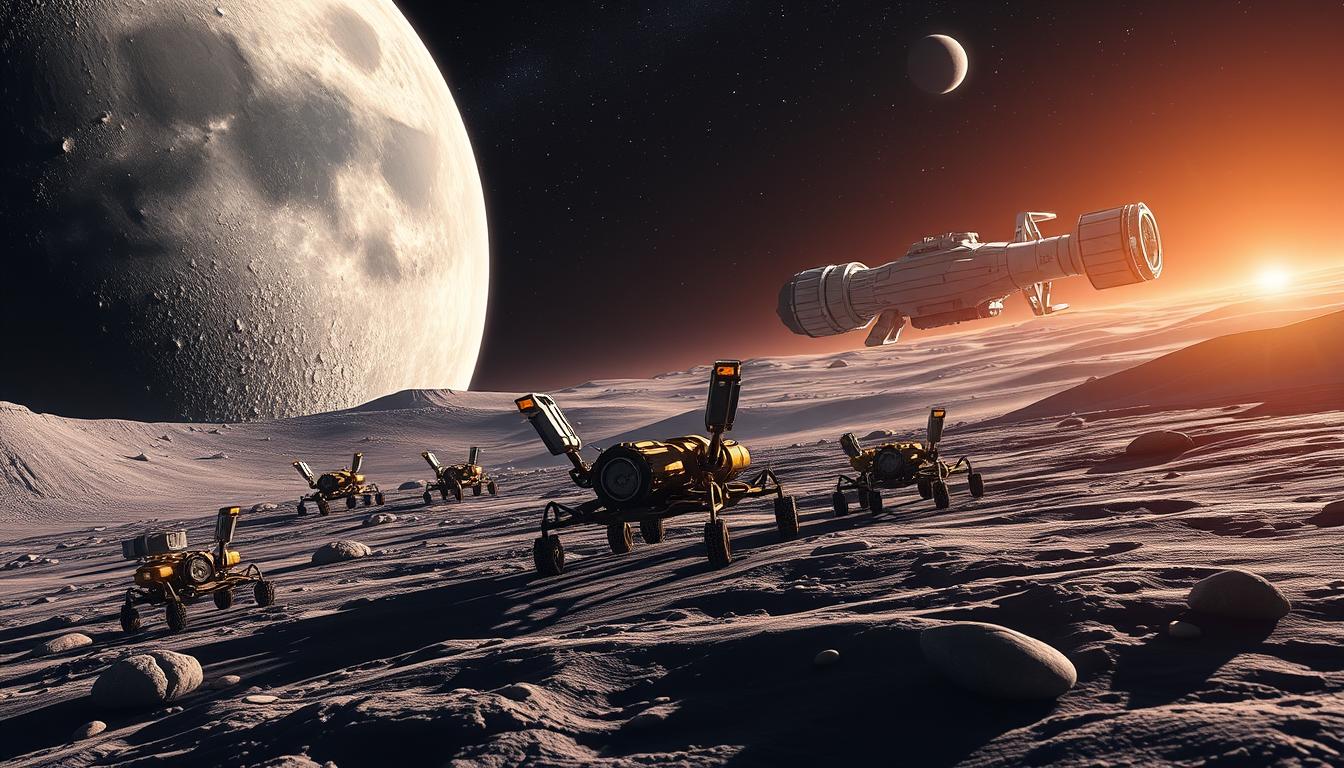The year 2025 is going to be huge for space exploration. We will see amazing uncrewed lunar missions and the first private space station. These big steps will help us learn more about the Moon.
They will also get us ready for missions with people on them. Thanks to teamwork between governments and private groups, we will see many cool things. These include science studies, new tech, and working together with other countries.
Key Takeaways
- 2025 will witness significant uncrewed lunar missions and the launch of the first private space station.
- The collaborative efforts among agencies like NASA, ESA, and private companies mark a new era in space exploration.
- Upcoming missions aim to enhance our understanding of lunar resources for sustainable exploration.
- Technological advancements are paving the way for increased capability in future missions.
- The space industry is expected to drive immense economic growth and job creation in the upcoming decades.
Overview of 2025 Space Launches
Looking ahead to 2025, space exploration will change a lot. We will see many missions to different planets and stars. This year will be big, with lots of upcoming space missions from space agencies and private companies.
NASA is still working on the Moon with the Commercial Lunar Payload Services (CLPS). This lets many companies send things to the Moon. Companies like Intuitive Machines and Firefly Aerospace are helping a lot. We also expect the launch of the Spectro-Photometer for the History of the Universe (SPHEREx) observatory. It will look at the sky a lot.
The ESA’s Space Rider and Japan’s M2/Resilience mission are exciting. They will study the Moon and other planets. They will do experiments and look at the Moon’s soil. China’s Tianwen-2 mission will also explore a near-Earth asteroid and a comet. This shows we all want to explore more.
With so many launches in 2025, it will be a big year for science and new technology. This will help us explore more of our solar system. It will take us to places we never thought we could go.
The Role of Uncrewed Lunar Missions in Space Exploration
Uncrewed lunar missions help us learn about the Moon. They let scientists study the Moon’s surface and collect important data. This data is key for future human missions.
These missions also check if the Moon can support life. They send tools to the Moon to gather information. This info helps plan for human bases on the Moon.
Uncrewed missions test new space technologies. Each mission proves these technologies work. This makes future human missions safer and more reliable.
Many important missions are coming up. Companies like Astrobotic and Intuitive Machines will help NASA. Their launches in 2025 will be a big step for space exploration.

Uncrewed lunar missions and 1st private space station among 2025 space launches
Space exploration is changing fast. Uncrewed lunar missions and the first private space station in 2025 are leading the way. NASA and other countries like China and India are working hard to explore the Moon again.
These missions are key for testing new tech and doing important research. They help get ready for humans to go to the Moon.
Significance of Uncrewed Missions
Uncrewed lunar missions are very important. They help us learn more about space without risking people’s lives. They use robots and AI to do cool things.
NASA’s Artemis program will start in 2025. It will help us understand the Moon better. This is a big step towards humans living on the Moon.
First Private Space Station Launch Plans
SpaceX and Blue Origin are making the first private space station. This is a big change from when only governments went to space. Axiom Space is building modules for a private station.
This change opens up new ways to do research and even go on vacation in space. It also helps NASA and private companies work together. This makes things cheaper and more innovative.
This new world of space is full of teamwork. Agencies like ESA, Roscosmos, and JAXA are all working together. They want to make big steps in science and help people.
The private space station industry is growing fast. It’s full of chances for new discoveries and business. This could make a lot of money in the future. It also inspires people to become scientists and engineers.
| Year | Mission Type | Key Players | Objectives |
|---|---|---|---|
| 2025 | Uncrewed Lunar Missions | NASA, China, India | Science research, technology testing |
| 2025 | First Private Space Station | SpaceX, Blue Origin, Axiom Space | Commercial use, research and tourism |
NASA’s Commercial Lunar Payload Services Initiative
NASA’s Commercial Lunar Payload Services (CLPS) is a big step in space exploration. It uses partnerships to send scientific payloads to the Moon. This effort shows how NASA and private companies can work together to make new discoveries.
Upcoming Missions by NASA’s CLPS
In 2025, NASA’s CLPS will launch many missions. Over 90 launches are planned at NASA’s Kennedy Space Center in Florida. Companies like Astrobotic and Intuitive Machines will carry scientific instruments to the Moon.
With a total value of $2.6 billion by 2028, CLPS shows NASA’s dedication to lunar exploration. It’s all about working together with private companies.
The Importance of Lunar Geology Studies
Exploring the Moon’s surface is key to learning about lunar geology. The Moon looks empty but has a layer of gravel, pebbles, and dust. These hold secrets we need to find.
So far, humans have only seen about 5% of the Moon. Ongoing missions are vital for finding resources and planning for humans to live there. NASA’s CLPS missions will help us understand the Moon’s geology. This is important for finding water and minerals for long-term living on the Moon.
Private Space Industry Contributions
The private space industry has grown a lot. Companies like SpaceX, Blue Origin, and Axiom Space are leading the way. They are making new technologies and working together with governments.
These partnerships help plan and carry out space missions. They make sure missions meet national goals and help technology grow.
Emerging Private Space Companies
New companies are changing space missions. Rocket Lab and Stoke Space are making launches better. They want to make space cheaper and more complex.
Other companies to watch include:
- Blue Origin: Planning to launch its MK1 Lunar Lander in 2025.
- Vast: Working towards launching the first commercial space station, offering unique opportunities for research and industrial applications.
- Gilmour Space Technologies: Developing hybrid propulsion systems to enhance launch efficiency.
Collaborations with Government Agencies
Private companies and governments are working together. NASA’s Artemis program is a great example. It aims to make big steps towards living on the moon.
These partnerships help create new technologies. They include:
| Company | Project | Collaborative Focus |
|---|---|---|
| SpaceX | Artemis III Lunar Landers | Reusable rocket technology |
| Blue Origin | MK1 Lunar Lander | Pathfinder lunar missions |
| Axiom Space | Commercial Space Station | Long-term scientific research |
These partnerships are key to moving forward. They show how private and public efforts can lead to great achievements in space.
Other Notable 2025 Space Missions
As 2025 gets closer, many space missions are getting attention. NASA’s SPHEREx and Japan’s M2/Resilience are exciting. They aim to explore the universe and the Moon.
NASA’s Spectro-Photometer for the History of the Universe (SPHEREx)
SPHEREx will launch in February 2025 on a SpaceX Falcon 9 rocket. It will study over 450 million galaxies and 100 million stars in the Milky Way. This mission will help us learn more about the universe, dark energy, and water ice in space.
Japan’s M2/Resilience Lunar Exploration Mission
Japan’s M2/Resilience mission will explore the Moon. It aims to land a rover and collect soil samples. This will help us understand the Moon’s geology better.
| Mission | Launch Vehicle | Launch Date | Key Objectives |
|---|---|---|---|
| SPHEREx | SpaceX Falcon 9 | February 2025 | Survey 450 million galaxies; study cosmic phenomena and ice presence |
| M2/Resilience | To be determined | 2025 | Landing a rover on the Moon; soil sample collection |
These missions show how space technology is getting better. They also show how countries work together in space. As these missions happen, we’ll learn more about the universe and the Moon.
Impact of Space Technology on Future Missions
Space technology is changing fast, making future missions better. New tools and methods help us explore the Moon and more. These changes make missions safer and more efficient, getting us ready for humans to explore.
Revolutionary Technologies for Lunar Exploration
New space technology brings better navigation and smart robots. These help spacecraft land on the Moon with great precision. Missions in 2025, like Blue Ghost 1 and Intuitive Machines, show how these techs help us study the Moon.
Developments in Reusable Spacecraft
Reusable spacecraft are a big step toward cheaper space travel. SpaceX is leading this effort, planning many Starship tests in 2025. This will make space travel more affordable, leading to more missions and discoveries.
Conclusion
The 2025 space missions are a big deal for space exploration. We will see many uncrewed lunar missions. Also, the first private space station will launch.
This year will bring big scientific wins. These efforts show we really want to learn about space. They also help us explore the Moon better.
Many countries and companies are working together. This includes Astrobotic and Intuitive Machines. They are all trying new things in space.
Each mission, like NASA’s CLPS and Japan’s M2/Resilience, helps us understand the Moon. It also helps countries work together in space.
These missions are just the start. They will help us go to Mars and beyond. Working together, we can learn so much more about space.


